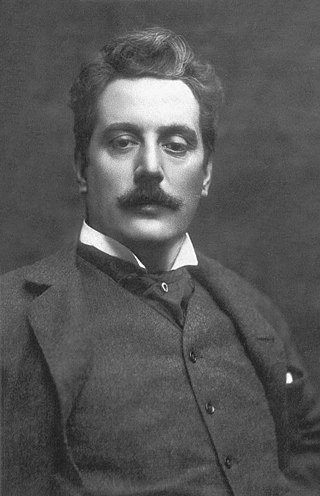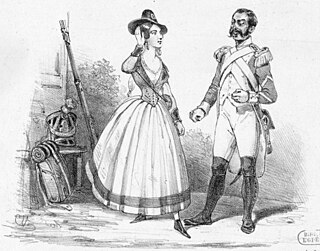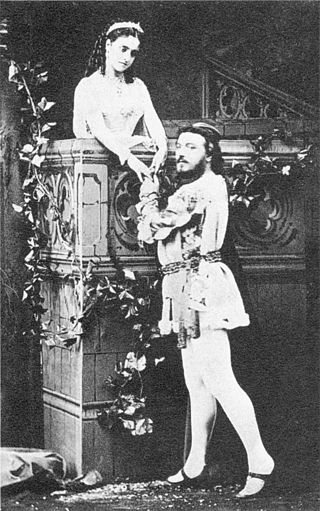
The Canterbury Tales is a collection of twenty-four stories that runs to over 17,000 lines written in Middle English by Geoffrey Chaucer between 1387 and 1400. It is widely regarded as Chaucer's magnum opus. The tales are presented as part of a story-telling contest by a group of pilgrims as they travel together from London to Canterbury to visit the shrine of Saint Thomas Becket at Canterbury Cathedral. The prize for this contest is a free meal at the Tabard Inn at Southwark on their return.

Giacomo Puccini was an Italian composer known primarily for his operas. Regarded as the greatest and most successful proponent of Italian opera after Verdi, he was descended from a long line of composers, stemming from the late-Baroque era. Though his early work was firmly rooted in traditional late-19th-century Romantic Italian opera, he later developed his work in the realistic verismo style, of which he became one of the leading exponents.

The Barber of Seville, or The Useless Precaution is an opera buffa in two acts composed by Gioachino Rossini with an Italian libretto by Cesare Sterbini. The libretto was based on Pierre Beaumarchais's French comedy The Barber of Seville (1775). The première of Rossini's opera took place on 20 February 1816 at the Teatro Argentina, Rome, with designs by Angelo Toselli.

Der fliegende Holländer, WWV 63, is a German-language opera, with libretto and music by Richard Wagner. The central theme is redemption through love. Wagner conducted the premiere at the Königliches Hoftheater Dresden in 1843.

Madama Butterfly is an opera in three acts by Giacomo Puccini, with an Italian libretto by Luigi Illica and Giuseppe Giacosa.

La fille du régiment is an opéra comique in two acts by Gaetano Donizetti, set to a French libretto by Jules-Henri Vernoy de Saint-Georges and Jean-François Bayard. It was first performed on 11 February 1840 by the Paris Opéra-Comique at the Salle de la Bourse.

Don Pasquale is an opera buffa, or comic opera, in three acts by Gaetano Donizetti with an Italian libretto completed largely by Giovanni Ruffini as well as the composer. It was based on a libretto by Angelo Anelli for Stefano Pavesi's opera Ser Marcantonio written in 1810 but, on the published libretto, the author appears as "M.A."

Un ballo in maschera is an 1859 opera in three acts by Giuseppe Verdi. The text, by Antonio Somma, was based on Eugène Scribe's libretto for Daniel Auber's 1833 five act opera, Gustave III, ou Le bal masqué.

"The Miller's Tale" is the second of Geoffrey Chaucer's Canterbury Tales (1380s–1390s), told by the drunken miller Robin to "quite" "The Knight's Tale". The Miller's Prologue is the first "quite" that occurs in the tales.

Henry Louis Reginald De Koven was an American music critic and prolific composer, particularly of comic operas.

The General Prologue is the first part of The Canterbury Tales by Geoffrey Chaucer. It introduces the frame story, in which a group of pilgrims travelling to the shrine of Thomas Becket in Canterbury agree to take part in a storytelling competition, and describes the pilgrims themselves. The Prologue is arguably the most familiar section of The Canterbury Tales, depicting traffic between places, languages and cultures as well as introducing and describing the pilgrims who will narrate the tales.

Roméo et Juliette is an opera in five acts by Charles Gounod to a French libretto by Jules Barbier and Michel Carré, based on Romeo and Juliet by William Shakespeare. It was first performed at the Théâtre Lyrique, Paris on 27 April 1867. This opera is notable for the series of four duets for the main characters and the waltz song "Je veux vivre" for the soprano.

La favorite is a grand opera in four acts by Gaetano Donizetti to a French-language libretto by Alphonse Royer and Gustave Vaëz, based on the play Le comte de Comminges by Baculard d'Arnaud with additions by Eugène Scribe based on the story of Leonora de Guzman. The opera concerns the romantic struggles of the King of Castile, Alfonso XI, and his mistress, the "favourite" Leonora, against the backdrop of the political wiles of receding Moorish Spain and the life of the Catholic Church. It premiered on 2 December 1840 at the Académie Royale de Musique in Paris.

La bohème is an Italian opera in four acts, with music and libretto by Ruggero Leoncavallo, based on Scènes de la vie de bohème (1851) by Henri Murger. The opera received a successful premiere at the Teatro la Fenice, Venice, on 6 May 1897.

Fedora is an opera in three acts by Umberto Giordano to an Italian libretto by Arturo Colautti, based on the 1882 play Fédora by Victorien Sardou. Along with Andrea Chénier and Siberia, it is one of the most notable works of Giordano.

Canterbury Tales is a musical conceived by Martin Starkie and written by Nevill Coghill and Martin Starkie with music by John Hawkins and Richard Hill. Originally presented at the Oxford Playhouse in 1964, it was expanded into a full-length musical and presented at the Phoenix Theatre, London on 21 March 1968. It played for a record-breaking 2080 performances and closed on 24 March 1973.

Gustav Kobbé was an American music critic and author, best known for his guide to the operas, The Complete Opera Book, first published (posthumously) in the United States in 1919 and the United Kingdom in 1922.

Oberon, or The Elf-King's Oath is a 3-act romantic opera with spoken dialogue composed in 1825–26 by Carl Maria von Weber. The only English opera ever set by Weber, the libretto by James Robinson Planché was based on the German poem Oberon by Christoph Martin Wieland, which itself was based on the epic romance Huon de Bordeaux, a French medieval tale. It was premiered in London on 12 April 1826.

Tiefland is an opera in a prologue and two acts by Eugen d'Albert, to a libretto in German by Rudolf Lothar. Based on the 1896 Catalan play Terra baixa by Àngel Guimerà, Tiefland was d'Albert's seventh opera, and is the one which is now the best known.

Cristoforo Colombo is an opera in four acts and an epilogue by Alberto Franchetti to an Italian libretto by Luigi Illica. It was written in 1892 to commemorate the 400th anniversary of Christopher Columbus' arrival in America.





















